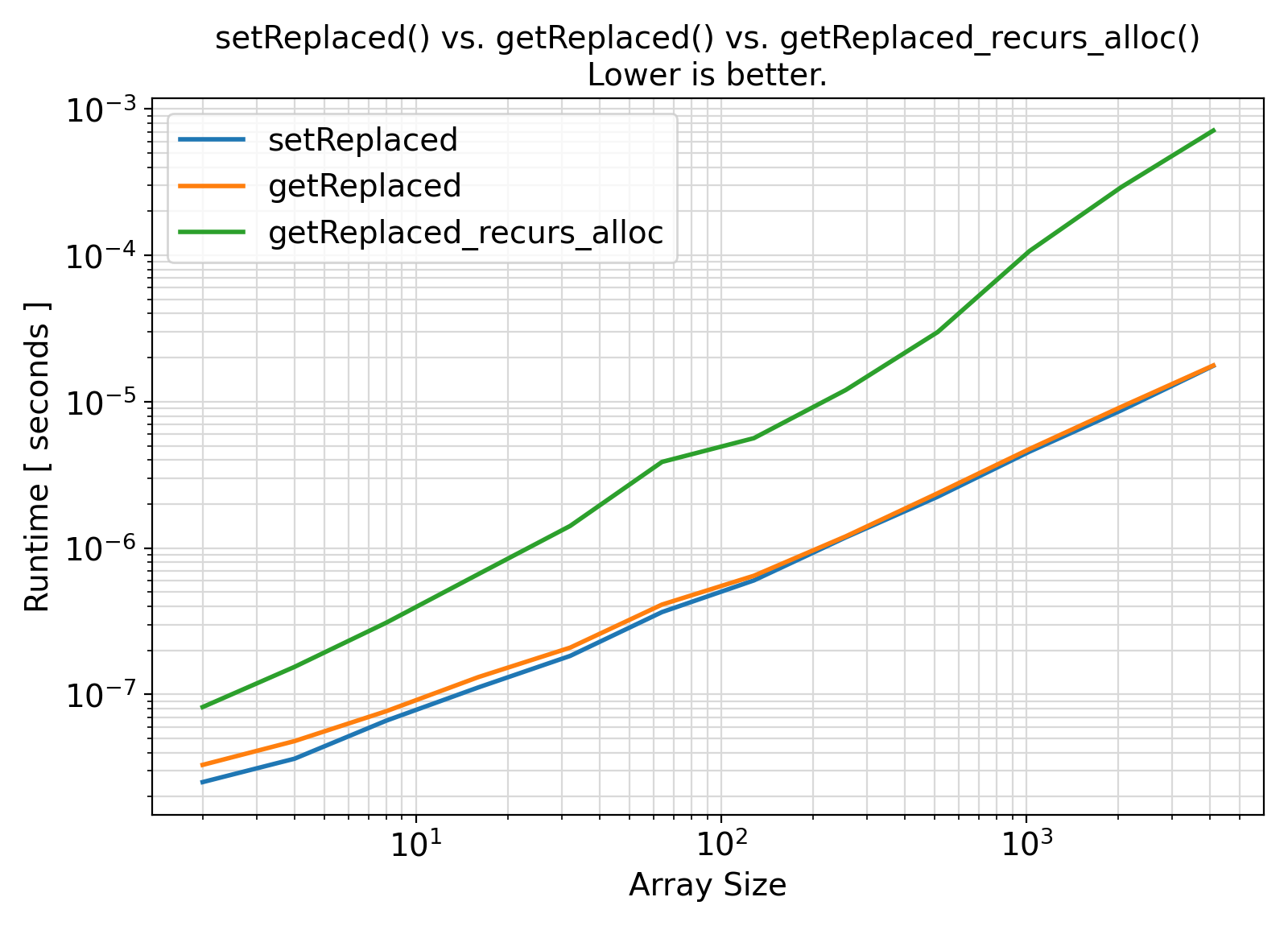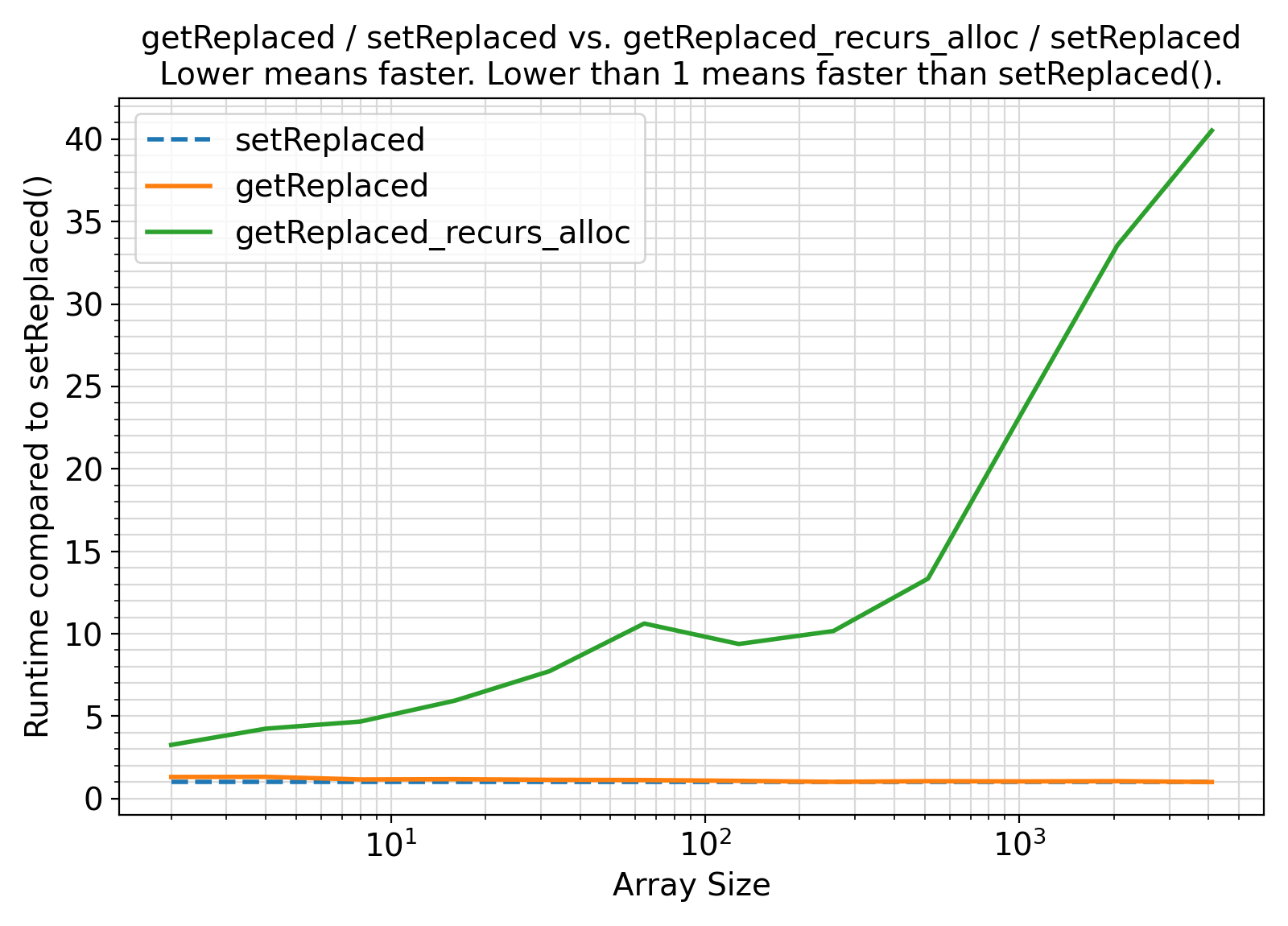This module contains procedures and generic interfaces for replacing patterns within arrays of various types.
More...
This module contains procedures and generic interfaces for replacing patterns within arrays of various types.
- Benchmarks:
Benchmark :: The runtime performance of getReplaced vs. setReplaced ⛓
4 use iso_fortran_env,
only:
error_unit
12 integer(IK) :: fileUnit
13 integer(IK) ,
parameter :: NSIZE
= 12_IK
14 integer(IK) ,
parameter :: NBENCH
= 3_IK
15 integer(IK) :: arraySize(NSIZE)
16 logical(LK) :: dummy
= .true._LK
17 character(:, SK),
allocatable :: array
18 character(
*, SK),
parameter :: pattern
= "a"
19 character(
*, SK),
parameter :: Replacement
= "**"
20 type(bench_type) :: bench(NBENCH)
22 bench(
1)
= bench_type(name
= SK_
"setReplaced", exec
= setReplaced , overhead
= setOverhead)
23 bench(
2)
= bench_type(name
= SK_
"getReplaced", exec
= getReplaced , overhead
= setOverhead)
24 bench(
3)
= bench_type(name
= SK_
"getReplaced_recurs_alloc", exec
= getReplaced_recurs_alloc , overhead
= setOverhead)
26 arraySize
= [(
2_IK**isize, isize
= 1_IK, NSIZE )]
28 write(
*,
"(*(g0,:,' '))")
29 write(
*,
"(*(g0,:,' '))")
"setReplaced() vs. getReplaced() vs. getReplaced_recurs_alloc()"
30 write(
*,
"(*(g0,:,' '))")
32 open(newunit
= fileUnit, file
= "main.out", status
= "replace")
34 write(fileUnit,
"(*(g0,:,','))")
"arraySize", (bench(i)
%name, i
= 1, NBENCH)
36 loopOverArraySize:
do isize
= 1, NSIZE
38 write(
*,
"(*(g0,:,' '))")
"Benchmarking with size", arraySize(isize)
41 bench(i)
%timing
= bench(i)
%getTiming(minsec
= 0.05_RK)
44 write(fileUnit,
"(*(g0,:,','))") arraySize(isize), (bench(i)
%timing
%mean, i
= 1, NBENCH)
46 end do loopOverArraySize
47 write(
*,
"(*(g0,:,' '))") dummy
48 write(
*,
"(*(g0,:,' '))")
58 subroutine setOverhead()
63 subroutine initialize()
64 allocate(
character(arraySize(isize)) :: array )
70 array(:)
= repeat(pattern,
len(array))
75 dummy
= dummy
.and. array(
1:
1)
== pattern
79 subroutine setReplaced()
88 subroutine getReplaced()
97 subroutine getReplaced_recurs_alloc()
Generate and return an arrayNew of the same type and kind as the input array, in which the requested ...
Replace the requested instances of the input pattern with the input replacement in the allocatable in...
Generate and return an object of type timing_type containing the benchmark timing information and sta...
This module contains procedures and generic interfaces for replacing patterns within arrays of variou...
pure recursive character(:, SK) function, allocatable getReplaced_recurs_alloc(array, pattern, replacement)
[LEGACY code] Generate and return a copy of the input array where all instances of the input pattern...
This module contains abstract interfaces and types that facilitate benchmarking of different procedur...
This module defines the relevant Fortran kind type-parameters frequently used in the ParaMonte librar...
integer, parameter RK
The default real kind in the ParaMonte library: real64 in Fortran, c_double in C-Fortran Interoperati...
integer, parameter LK
The default logical kind in the ParaMonte library: kind(.true.) in Fortran, kind(....
integer, parameter IK
The default integer kind in the ParaMonte library: int32 in Fortran, c_int32_t in C-Fortran Interoper...
integer, parameter SK
The default character kind in the ParaMonte library: kind("a") in Fortran, c_char in C-Fortran Intero...
This is the class for creating benchmark and performance-profiling objects.
Example Unix compile command via Intel ifort compiler ⛓
3ifort -fpp -standard-semantics -O3 -Wl,-rpath,../../../lib -I../../../inc main.F90 ../../../lib/libparamonte* -o main.exe
Example Windows Batch compile command via Intel ifort compiler ⛓
2set PATH=..\..\..\lib;%PATH%
3ifort /fpp /standard-semantics /O3 /I:..\..\..\include main.F90 ..\..\..\lib\libparamonte*.lib /exe:main.exe
Example Unix / MinGW compile command via GNU gfortran compiler ⛓
3gfortran -cpp -ffree-line-length-none -O3 -Wl,-rpath,../../../lib -I../../../inc main.F90 ../../../lib/libparamonte* -o main.exe
Postprocessing of the benchmark output ⛓
3import matplotlib.pyplot
as plt
9methods = [
"setReplaced",
"getReplaced",
"getReplaced_recurs_alloc"]
11df = pd.read_csv(
"main.out")
17ax = plt.figure(figsize = 1.25 * np.array([6.4,4.6]), dpi = 200)
21 plt.plot( df[
"arraySize"].values
26plt.xticks(fontsize = fontsize)
27plt.yticks(fontsize = fontsize)
28ax.set_xlabel(
"Array Size", fontsize = fontsize)
29ax.set_ylabel(
"Runtime [ seconds ]", fontsize = fontsize)
30ax.set_title(
"setReplaced() vs. getReplaced() vs. getReplaced_recurs_alloc()\nLower is better.", fontsize = fontsize)
34plt.grid(visible =
True, which =
"both", axis =
"both", color =
"0.85", linestyle =
"-")
35ax.tick_params(axis =
"y", which =
"minor")
36ax.tick_params(axis =
"x", which =
"minor")
44plt.savefig(
"benchmark.getReplaced_vs_setReplaced.runtime.png")
50ax = plt.figure(figsize = 1.25 * np.array([6.4,4.6]), dpi = 200)
53plt.plot( df[
"arraySize"].values
54 , np.ones(len(df[
"arraySize"].values))
59plt.plot( df[
"arraySize"].values
60 , df[
"getReplaced"].values / df[
"setReplaced"].values
63plt.plot( df[
"arraySize"].values
64 , df[
"getReplaced_recurs_alloc"].values / df[
"setReplaced"].values
68plt.xticks(fontsize = fontsize)
69plt.yticks(fontsize = fontsize)
70ax.set_xlabel(
"Array Size", fontsize = fontsize)
71ax.set_ylabel(
"Runtime compared to setReplaced()", fontsize = fontsize)
72ax.set_title(
"getReplaced / setReplaced vs. getReplaced_recurs_alloc / setReplaced\nLower means faster. Lower than 1 means faster than setReplaced().", fontsize = fontsize)
76plt.grid(visible =
True, which =
"both", axis =
"both", color =
"0.85", linestyle =
"-")
77ax.tick_params(axis =
"y", which =
"minor")
78ax.tick_params(axis =
"x", which =
"minor")
79ax.legend ( [
"setReplaced",
"getReplaced",
"getReplaced_recurs_alloc"]
86plt.savefig(
"benchmark.getReplaced_vs_setReplaced.runtime.ratio.png")
Visualization of the benchmark output ⛓
Benchmark moral ⛓
- The procedures under the generic interface getReplaced are functions while the procedures under the generic interface setReplaced are subroutines.
From the benchmark results, it appears that the functional interface performs slightly less efficiently than the subroutine interface.
Note that this benchmark does not even include the cost of repeated reallcations, that is, the allocation of Replaced happen only once in all tests.
- Furthermore, the recursive
getReplaced() implementation with recursive allocations appears to be 3-33 times slower than the subroutine implementation, depending on the size of the array within which the pattern is to be replaced.
- Note that this benchmark considers the worst-case scenario where all elements of the input
array match the input pattern and must be therefore, replaced.
- See also
- pm_arrayInsert
pm_arrayRemove
- Test:
- test_pm_arrayReplace
Final Remarks ⛓
If you believe this algorithm or its documentation can be improved, we appreciate your contribution and help to edit this page's documentation and source file on GitHub.
For details on the naming abbreviations, see this page.
For details on the naming conventions, see this page.
This software is distributed under the MIT license with additional terms outlined below.
-
If you use any parts or concepts from this library to any extent, please acknowledge the usage by citing the relevant publications of the ParaMonte library.
-
If you regenerate any parts/ideas from this library in a programming environment other than those currently supported by this ParaMonte library (i.e., other than C, C++, Fortran, MATLAB, Python, R), please also ask the end users to cite this original ParaMonte library.
This software is available to the public under a highly permissive license.
Help us justify its continued development and maintenance by acknowledging its benefit to society, distributing it, and contributing to it.
- Copyright
- Computational Data Science Lab
- Author:
- Fatemeh Bagheri, Wednesday 12:20 AM, October 13, 2021, Dallas, TX
| pure recursive character(:, SK) function, allocatable pm_arrayReplace::getReplaced_recurs_alloc |
( |
character(*, SK), intent(in) |
array, |
|
|
character(*, SK), intent(in) |
pattern, |
|
|
character(*, SK), intent(in) |
replacement |
|
) |
| |
[LEGACY code]
Generate and return a copy of the input array where all instances of the input pattern in it are replaced with the input replacement.
- Parameters
-
| [in] | array | : The input scalar character of default kind SK.
|
| [in] | pattern | : The input scalar the same type and kind as the input array representing the pattern to be searched within array.
|
| [in] | replacement | : The input scalar the same type and kind as the input array representing the replacement for instances of pattern in array.
|
- Returns
arrayNew : The output copy of the input array where all instances of the input pattern in it are replaced with the input replacement.
- Warning
- This procedure is solely provided for benchmarking purposes to compare the performance difference between a naive recursive allocation method of replacement and the optimized method implemented under the generic interfaces in getReplaced and setReplaced.
- See also
- getReplaced
setReplaced
test_pm_arrayReplace
Final Remarks ⛓
If you believe this algorithm or its documentation can be improved, we appreciate your contribution and help to edit this page's documentation and source file on GitHub.
For details on the naming abbreviations, see this page.
For details on the naming conventions, see this page.
This software is distributed under the MIT license with additional terms outlined below.
-
If you use any parts or concepts from this library to any extent, please acknowledge the usage by citing the relevant publications of the ParaMonte library.
-
If you regenerate any parts/ideas from this library in a programming environment other than those currently supported by this ParaMonte library (i.e., other than C, C++, Fortran, MATLAB, Python, R), please also ask the end users to cite this original ParaMonte library.
This software is available to the public under a highly permissive license.
Help us justify its continued development and maintenance by acknowledging its benefit to society, distributing it, and contributing to it.
- Copyright
- Computational Data Science Lab
- Author:
- Amir Shahmoradi, September 1, 2017, 12:00 AM, Institute for Computational Engineering and Sciences (ICES), The University of Texas Austin
Definition at line 14612 of file pm_arrayReplace.F90.
References getReplaced_recurs_alloc(), and pm_kind::IK.
Referenced by getReplaced_recurs_alloc().





